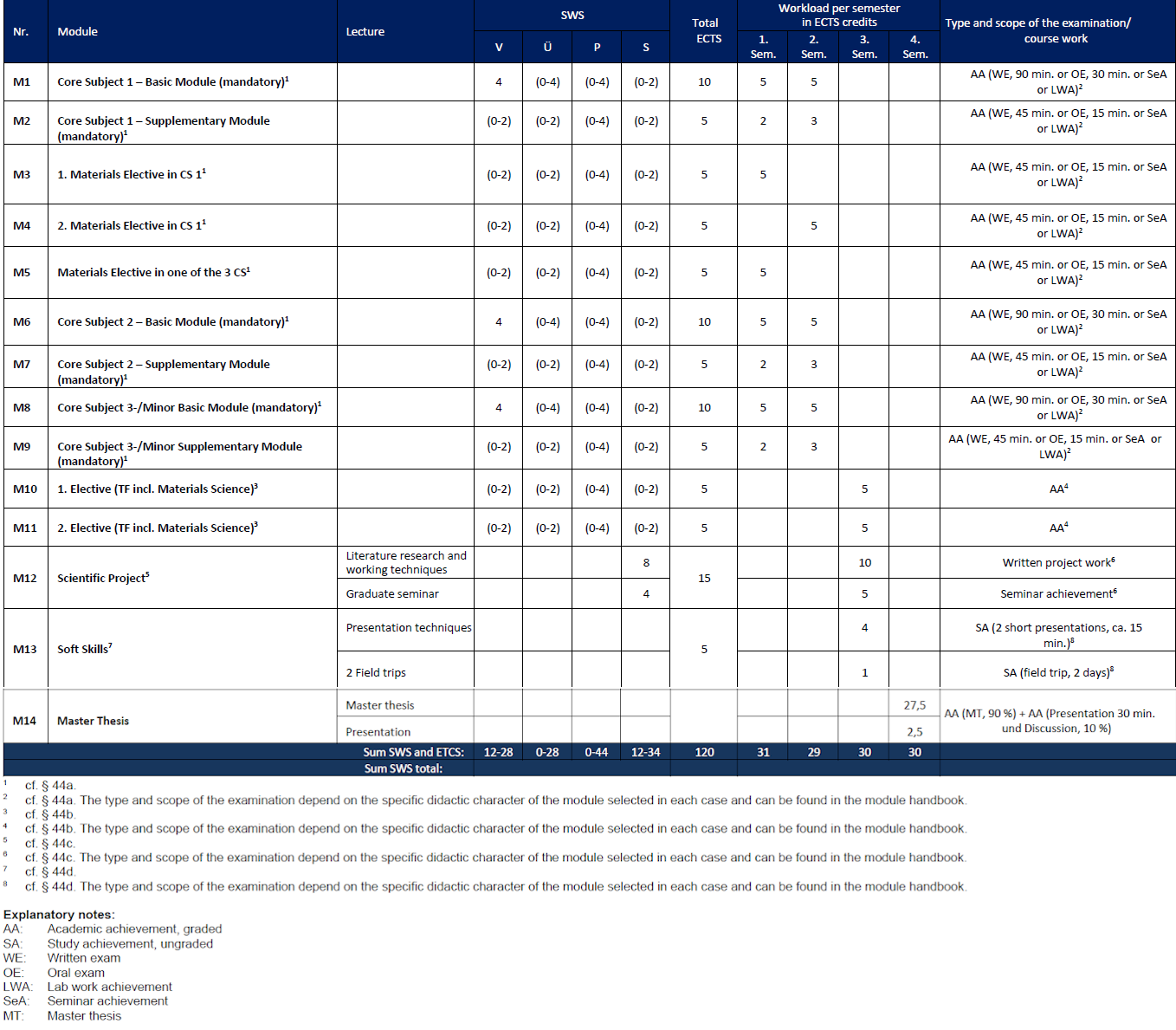Course Outline

Master’s degree = deepen knowledge + broaden knowledge + learn scientific working methods
At the beginning of their studies, students decide on three core subjects that can be selected from the nine specialist areas of materials science. This determines the subject-specific profile of the field of study and also ensures the breadth of the materials science education.
An extensive selection of supplementary electives allows for specialization and deepening of his or her professional competencies based on both the individual interests and future career plans of each student.
In order to round off the scientific profile, special emphasis is placed on the acquisition of soft skills and a confident approach to scientific project work in addition to the teaching of specialist knowledge.
The standard period of study for the Master’s program is four semesters. The number of ECTS credits required for successful completion is 120 ECTS credits.
All examinations are taken during the course of study.
For further details, please refer to the program’s examination regulations.
Course overview

Core subjects (M1-M9)
From the catalog of core subjects three are selected. Core subject 1 has a scope of 25 ECTS. It is divided into a basic module of 10 ECTS and a supplementary module of 5 ECTS. Both basic and supplementary modules are compulsory modules within the selected core subject and must be taken. In addition, there are two elective modules of 5 ECTS each, which can be freely selected from a subject pool.
Core subject 2 and core subject 3 each have a scope of 15 ECTS and are also divided into a basic and a supplementary module. These are compulsory modules within the selected core subjects.
In addition, a core subject elective module of 5 ECTS must be chosen in one of the three core subjects (M5).
The following subjects can be selected as core subjects:
- General Materials Properties
- Materials Science and Engineering for Metals
- Glass and Ceramics
- Surface Science and Corrosion
- Polymer Materials
- Materials for Electronics and Energy Technology
- Biomaterials
- Materials Simulation
- Micro- and Nanostructure Research
Electives Module (M10 und M11)
In addition to the core subjects, two elective modules (M10 and M11) must be taken, which include lectures and seminars, each worth 5 ECTS credits. The modules M10 and M11 can be taken from the offer of the Department of Materials Science and Engineering as well as from the offer of the other departments of the Faculty of Engineering.
The purpose of the electives is to enable students to deepen and broaden their expertise in the field of materials science and materials engineering on current issues in the respective specialties and to sharpen their profile with regard to their intended future career field.
Core subject basic and supplementary modules cannot be used as electives.
Scientific Project and Soft Skills (M12-M14)
In addition to the core and elective subjects, the modules “Scientific Project” (15 ECTS), “Soft Skills” (5 ECTS) and “Master’s Thesis with Presentation” (30 ECTS) must also be taken.
Both the module “Scientific Project” (M12) and the Master’s thesis should be taken in a core subject in which at least 25 ECTS credits have been earned.
The module “Soft Skills” (M13) is taken in one of the three core subjects.
Studying abroad during the Master program
In contrast to the Bachelor’s program, a stay abroad can be integrated into the Master’s program relatively easily and, if necessary, without significant loss of time. The 3rd semester is particularly suitable for this. In consultation with the study advisors or the supervising professors, equivalent study achievements abroad can be accepted.
The Lifelong Learning Program is an action program of the EU Commission to promote general cooperation in the field of education, student and employee mobility in Europe. ERASMUS – as part of the Lifelong Learning Program – offers students the opportunity to gain experience in other European countries, to get to know the language and culture, and to take advantage of the study opportunities offered there. Students from a wide variety of institutes can spend study periods abroad (i.e. take courses and participate in examinations), as well as practical stays for laboratory or industrial internships or for the completion of their theses or dissertations, in each case for a period of three to twelve months. During this time, they are supported with approximately 150 euros (studies) or 400 euros (internship) per month and are exempt from any tuition fees at the host university. The only requirements for participation are enrollment at FAU, first-time participation in the program, and sufficient language skills in the target country.
Application procedure
1. selection of the university of your choice
In the following list you will find an overview of our partner universities from which you can select your desired university. Since the number of study places is limited, it is advisable to also specify 1-2 “substitute universities”. Helpful is the page of the Department of International Affairs with reports of students’ experiences.
If the number of applications exceeds the number of available places, students are selected according to their course of study, subject grades, language skills and number of semesters.
Please consider the different lecture periods when choosing your preferred university!!!
2. application at the office of materials science
Application deadlines for study abroad in WS and/or SS: 1st of February
Required documents: Please bring this Erasmus application formular 2425
for a personal interview at Susanne Michler’s office (please make an appointment!) or send the form with the letter of motivation to Susanne Michler .
ATTENTION: If there are several applications for the same study place, it will be allocated on a “first come, first served” basis!
3. nomination
After reviewing the application documents, the Office of Materials Science informs the applicants about the result and sends a nomination list to the International Affairs Office.
4. registration at the International Affairs Office (RIA – Mobility Team)
The RIA is the central International Office of the University, responsible for the administrative process of the ERASMUS program and the payment of the study grant. After the successful nomination, this office is also an important contact for you, informing you about the further formalities. The RIA will ask all nominated students by e-mail to register in the RIA online system. Furthermore, the RIA informs the host university about the nominated students as well as the students about the registration modalities of the host university.
5. registration at the foreign university
After the RIA has informed you, you now have to register yourself at the foreign university. Adherence to the respective registration deadlines is very important, otherwise no exchange place can be guaranteed!
6. further ERASMUS forms
After provision by the EU, the RIA will send you all necessary ERASMUS forms (e.g. for scholarship and learning agreement with indication of the courses you would like to take).
The following partnerships of the Department of Materials Science exist (as of 10/2023): ERASMUS partnerships